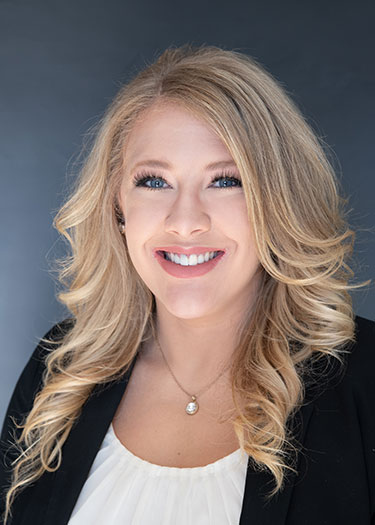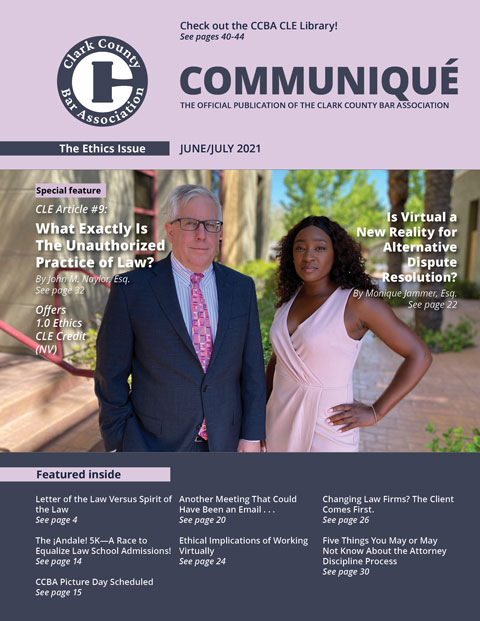In today’s world, lawyers frequently switch firms. Often, lawyers see it as a simple change of employment. The Nevada Rules of Professional Conduct (“RPC”) dictate otherwise. The clients’ interests must always come first. Guidance from a few key rules can help the departing lawyer (and law firms) avoid potential issues.
Communication with the client
RPC 1.4 requires a lawyer to keep the client reasonably informed about the status of the matter on which the lawyer is working. This includes advising the client of a lawyer’s impending departure from the firm if that lawyer had substantial responsibility for the client’s active matters and/or significant personal contact with the client. It can be a fine line as to what is considered “substantial” or “significant,” but erring to inform the client is always better.
The client must be informed: (1) when the lawyer is leaving; (2) that the client has the option of staying with the firm, going with the departing lawyer, or selecting new counsel; and (3) how any retainer will be treated. Preferably this is a joint letter from the firm and departing lawyer. The letter should be sent well in advance of the lawyer’s departure and provide ample time for the client to respond with a signed acknowledgment and, if applicable, instruction where to send the file. Accordingly, the lawyer should also give the firm ample notice of departure (though fixed notice periods are generally impermissible under RPC 5.6(a)).
The departing lawyer may not interfere with the firm’s contracts with its clients, utilize firm resources to set up a new firm, or solicit the firm’s existing staff or fellow lawyers before leaving.
Confidential information
RPC 1.6 requires a lawyer to make reasonable efforts to prevent inadvertent or unauthorized disclosure of, or unauthorized access to, information relating to the representation of the client and prohibits a lawyer from revealing such information.
This does not prevent a lawyer from taking documents prepared by the lawyer and are considered the lawyer’s property or are in the public domain. If the files are the law firm’s property, the lawyer must obtain the law firm’s consent. Whether a file is the property of the lawyer or firm will turn on principles of property and trade secret law. If those materials contain client information, the lawyer must protect the information to the extent required under the rules.
This rule is especially relevant with “Bring Your Own Device” policies. Lawyers should take special precautions to ensure they scrub unauthorized and confidential information from personal devices that were used in the course of their employment. If the firm authorizes the lawyer to take certain information, the lawyer must be vigilant in protecting such information and ensure it is not used to the disadvantage of the former firm’s clients, particularly if the information “relates to representation” of the clients under RPC 1.8(b) and RPC 1.9(c).
Importantly, this rule does not prohibit the lawyer from disclosing client names to the new firm “to detect and resolve conflicts of interest,” so long as such disclosure would not compromise the attorney-client privilege or otherwise prejudice the client.
Conflicts
It is imperative that the lawyer—and both the new firm and old firm—avoid conflicts of interest implicated by the affiliation with client matters that either remain at the former firm or are transferred to the new firm. RPC 1.7 through RPC 1.12 contain provisions defining types of conflicts and setting forth specific limitations. Evaluating potential conflicts implicated by the lawyer’s transition must be done before the lawyer departs the former firm.
Duties of law firms
Law firms have their own duty to protect clients and ensure an ethical transition based on RPC 5.1(b), which requires that supervisory lawyers make reasonable efforts to ensure subordinate lawyers conform to the rules of ethics. This includes assisting in evaluating conflicts and ensuring clients’ confidential information is protected. The former firm and departing lawyer must work together to ensure all clients continue to be represented with competence and diligence throughout the transition.
Additional rules may be implicated by changing firms. Ethical issues can easily become problematic and tricky to navigate. Remain prudent, consult the rules of ethics and related legal authority, and seek guidance if needed.
About the author

Stephanie Glantz, Esq. is an associate at Bailey Kennedy and practices in the areas of litigation, appellate advocacy, healthcare law, business and corporate law, administrative and gaming law, and ethics and professional responsibility law.

About this article: This article was originally published in the “Ethics” issue of Communiqué, the official publication of the Clark County Bar Association, (June/July 2021). See https://clarkcountybar.org/about/member-benefits/communique-2021/communique-june-july-2021/.
© 2021 Clark County Bar Association (CCBA). All rights reserved. No reproduction of any portion of this issue is allowed without written permission from the publisher. Editorial policy available upon request.
